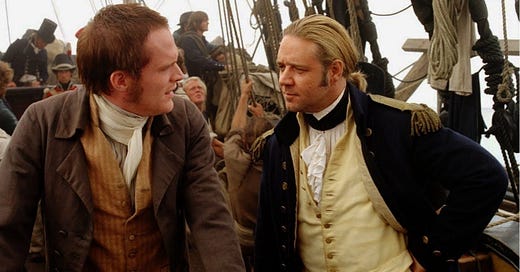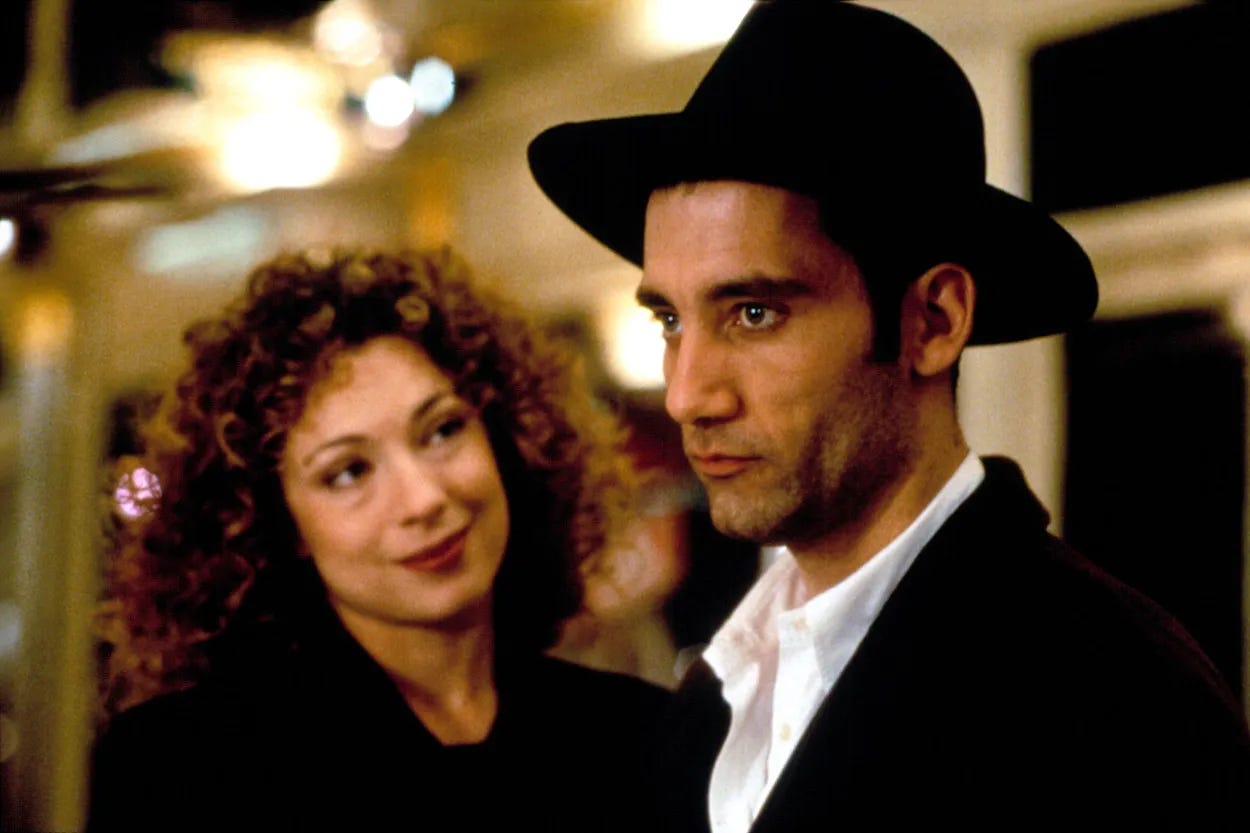The Ahoy Boys.
That is my nickname for the historical action-drama Master and Commander: The Far Side Of The World. I call the movie that because I have intimacy issues, and I sometimes make fun of things I love. I shouldn’t, of course. I use humor to create distance between myself and loved ones and art and issues that emotionally move me. And I love The Ahoy Boys. I rented it on Amazon a few days ago. I watch at least once a year, sometimes more.
Peter Weir’s 2003 Napoleonic-era naval epic follows the adventures of the HMS Surprise, an 18th-century Royal frigate, fighting the French on the high seas. The movie is about the crew of the compact 24-gun ship, a salty collection of rough-and-ready seadogs, and the tender relationship between Captain “Lucky” Jack Aubrey and the ship’s gentle surgeon Stephen Maturin—the former a man of war, the latter a man of science. In every friendship, there is the person who wants to fire cannons and brandish cutlasses and the person who wants to go on nature walks and study turtles. Which are you? Trick question: you can be both.
Australia-born Weir was a Hollywood filmmaker who was effortlessly able to infuse the popcorn flicks he was hired to direct with intelligence and humanity. Sexy cop thriller? Weir's Witness from 1985 is hard to beat, featuring one of Harrison Ford's best performances (Ford is also at his best in Weir's dark coming-of-age drama Mosquito Coast.) Inspirational teacher movie? Check out 1989’s Dead Poet's Society, one of the best, starring Robin Williams as a provocative educator shaking up a stuffy private school. Weir's 1998 comedy The Truman Show showed Hollywood that Jim Carrey was more than just a rubberfaced funnyman, but a sensitive actor, too. Few movies predict the future, but The Truman Show certainly did, and it continues to warn us about a society built on surveillance. That movie would be Weir's masterpiece were it not for The Ahoy Boys.
One of Master and Commander: The Far Side Of The World’s many strengths is its straightforward linear narrative. It’s a series of slow, and suddenly terrifying, chases! The movie opens with the HMS Surprise being ambushed by Le Bad Guys off the coast of Brazil and then narrowly escaping. The film ends with a brutal battle between two fragile, creaking, tall wooden ships floating next to each other in the middle of an infinite ocean. In between the first and last action set pieces is what I call boat life.
Boat life is hard work but also fun. There is a lot of rope pulling and rope ladders and ropes being tied in knots. Those were rope-centric times. The rules of boat life are strict—harsh even—and the officers are a little distant. If you’re Captain Jack and Dr. Stephen, played by a healthy-looking ponytailed Russell Crowe and the beautifully cerebral Paul Bettany, respectively, then boat life is very busy. Your days are spent disciplining the crew, shouting orders, or stitching up the wounded, and your nights are spent drinking wine and playing the violin. The HMS Surprise is a cross between a dictatorship and a family, and everyone is madly in love with one person, the HMS Surprise herself.
The historical accuracy of Weir’s movie is another strength: life at sea in 1805 is as strange and unfamiliar to me as life in a spaceship in 2305. I will acknowledge that the British Empire spent centuries sailing around the world oppressing everyone they met, but, remarkably, entire generations of men squeezed into giant oak coffins with billowy sails for years at a time, bobbing along, eating salted pork, and sleeping in hammocks and trying not to die, which is easy when you’re in the middle of the Pacific.
The crew of the HMS Surprise are not merchants, nor are they interested in plunder. In the timeline where Master and Commander: The Far Side Of The World occurs, they’re stiffed-lipped heroes fighting the evil conqueror Napoleon’s forces.
As the main besties, Crowe and Bettany turn in perfect performances. They’re both swaggering in their ways and awkwardly vulnerable, and both are students of the “show, don’t tell” school of manly affection. The normally intense Crowe allows his character to be soft, and I wish he had been allowed to revisit “Lucky” Jack.
It’s disappointing this wasn’t a bigger box-office hit because we would have gotten sequels. Even the movie’s subtitle suggests that someone thought there’d be a second Master and Commander. The Patrick O’Brien book series Master and Commander is based on twenty books, and I still want to see more of them turned into big-budget spectacles.
The Disney mega-hit Pirates of the Caribbean came out the same year, and it seems America was only in the mood for one historic, nautical-themed franchise, and I’ll be blunt when I write that we chose poorly. The Pirates movies are gorgeous, certainly, but they’re overstuffed with plot and special effects, and I was never a fan of Depp’s Jack Sparrow, the swaggering, rum-swilling star of that blockbuster franchise. Sparrow is just a birthday clown version of a character like Russel’s Captain Jack, who, of course, would never become a pirate — they were the terrorists of the 18th century.
Like all of Patrick O’Brien’s ‘Age of Sail’ novels, Master and Commander is about Jack and Stephen because they’re devoted, intimate friends, and I guess having one good, loyal, loving friend is the most valuable treasure in the world. They’re the ones who throw you a rope when you fall overboard. I rewatched the movie recently because it's about the strength of friendship, and I don’t think I could have navigated the last few tumultuous years without those relationships. When the seas were rough, my ahoy people were there with me in the boat.







This was a great movie. And there's kind of another Jack Sparrow comparison -
Peter Sellers in Dr. Strangelove vs Henry Fonda in Failsafe. Both came out in 1964 both are great movies but Dr. Strangelove is FUN as compared to Failsafe, which might've kept you awake through the night in 1964. Failsafe didn't get much box office traffic, either.
I liked both Pirates of the Caribbean and Master and Commander. They were much different movies, one was rather comic, and Johnny Depp pulls off nothing but a great Keith Richards impression the whole way through, so obvious, that Keith Richards shows up in a sequel as his father. Master and Commander is great, but the thing that struck me the most was the Max Pirkins performance as the young midshipman - the 13 YEAR OLD MIDSHIPMAN MIND YOU - who loses his arm in battle.
That's a tough bit of history. The other flip side of that, is being in your twenties, thirties or forties, having to take orders from a thirteen year old naval officer after you've been press ganged. That's a bummer. Both of these movies though are definitely - 'swashbuckling' but that is presented in two different ways and I think they both do an excellent job. But these movies are like music- you pick them dependent upon your mood.
As far as the English go - "I will acknowledge that the British Empire spent centuries sailing around the world oppressing everyone they met" - that is true, but better the English than the human-sacrifing folks out of Apocalypto. Imagine those good wonderful people with a sea-going Navy. Imagine Vikings all over again, world wide. Also, Charles Napier is a name to look up. No, the world is not perfect, neither are the English but it could've been much, much worse.
All that said, John Devore, you are one helluva writer. I like it when you go beyond 150. You are easy to read. Look forward to your book . Take care. Have a good week and a better life.
this feels like it may be a word or two longer than 150